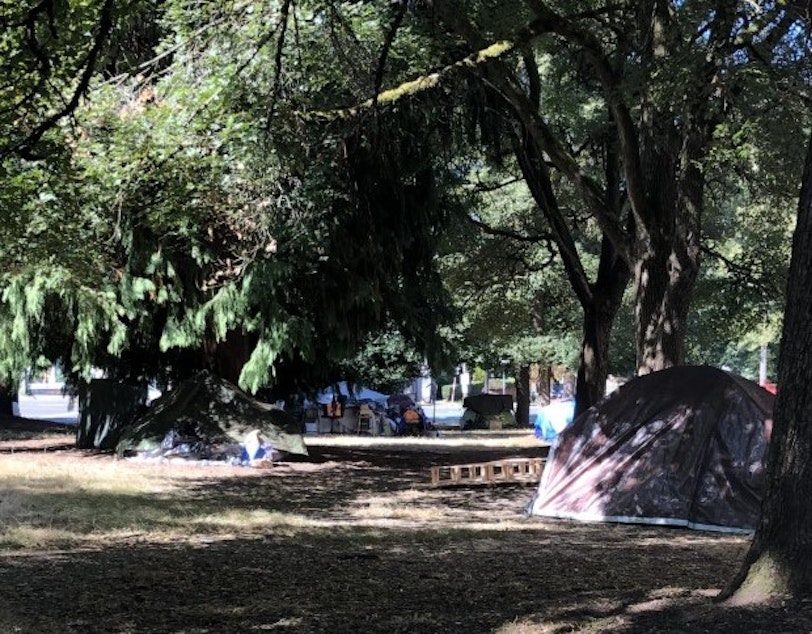Seeking a foundation for change at the crossroads of homelessness and Covid-19

There are things many of us take for granted: to have a place to live, to rest, to cook and enjoy meals, to bathe and do laundry. If you're experiencing homelessness, chances are pretty good you don't take those things for granted. Being without such basic services during a pandemic raises the difficulty to another level altogether.
Alison Eisinger is the Executive Director of the Seattle/King County Coalition on Homelessness. She has worked in the homeless community for many years.
This interview has been edited for clarity.
You were out at a homeless encampment this morning, with outreach workers. Can you give me a sense of the changes that are visible to you as you walk around at this point in the pandemic?
I have just this morning been to three different locations. My sense is that there is increasing desperation, because we have more or less abandoned people who are currently without homes to fend as best as they can. We definitely are seeing that folks are struggling to get their basic basic needs met.
The most recent one night count of King County's homeless population, back in the earlier part of this year, put that number at just under 12,000, with nearly half of those folks unsheltered. That was up 5% over the previous year. Do you know if there's any change in that number at this point?
What I think is highly likely is that that number has increased in terms of the numbers of people without shelter. So I think there are a lot of people who are struggling, and as we brace for what could be an additional wave of evictions and foreclosures. We have to ensure that we don't wind up with thousands, tens of thousands, more people in King County and across our state being made homeless, because we're not currently able to support people.
Sponsored
As this pandemic has progressed, we have learned that one of the main ways to prevent the spread of the virus is physical distancing. Local officials have said that it is urgent that we move away from group shelters, and move towards individual housing. I want to play you some of King County Executive Dow Constantine’s conversation with KUOW earlier this week.
“I am very eager for us as a community to embrace the idea that people need to be gotten into housing, with supports if they have underlying challenges that require that, and that we can move away from the congregate shelter that just has people cycling in overnight, and back out into the streets with no forward progress in their lives.”
The executive says he's very eager. He hopes that we can move towards these plans. Are local officials doing enough to create a plan here?
Both Executive Constantine and Mayor Durkan will be presenting their budgets to the respective city and county councils towards the end of September, I believe. I hope that they will be including both local and federal Cares Act resources to do exactly that — to move people from these relatively difficult to manage group settings into individual rooms and hotels. That's a big undertaking, and we need to see more of what we have seen has worked.
Our rainy season here in Western Washington usually starts around the end of October, which could, well, drive more people inside. What is your number one priority for the fall and winter when it comes to protecting folks who are living without shelter to protect them from Covid?
Sponsored
Our number one priority all year round is to get more people into decent, sustainable, indoor, safe places. For some people, that means more housing. For some people, it may mean shelter, and there may be an in-between that we are sort of inventing as we go.
And, it's not only the rainy season. It's shorter days, longer nights. It's colder weather. People are going to suffer the effects of exposure. It's also flu season, and flu symptoms and Covid symptoms have enormous overlap. So, we need to make sure that what we are doing is taking a holistic and dramatic set of steps forward.
This crisis, this pandemic, could actually bear within it the foundation of saying, you know what, not only is it unacceptable for six or seven thousand people to be unsheltered, overnight and during the day, as a standard, it's actually unhealthy for them, and for everyone, and we're going to take a different approach.
It is possible. We've seen dramatic, quick action, to set up ways to get people food, to get people health care, to get people in shelter. We need to amp that up, and we need to set ourselves, I think, a goal of getting at least 3000 more people inside before the end of the year.
Listen to the interview by clicking the play button above.


